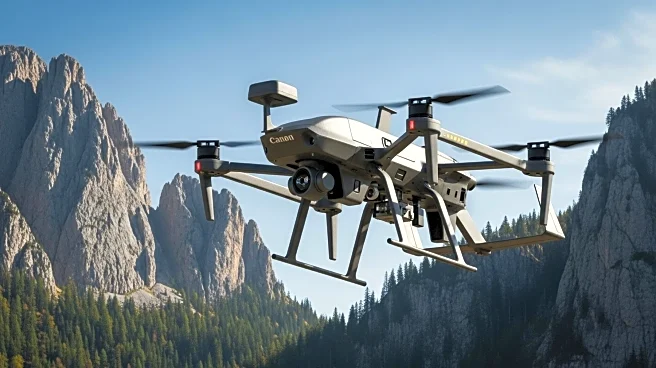What's Happening?
NATO has initiated a new operation named 'Eastern Sentry' in response to recent Russian drone incursions into Polish airspace. The operation was announced by NATO Secretary-General Mark Rutte following the entry of at least 19 drones into Poland during a Russian attack on Ukraine. Polish President Karol Nawrocki signed a decree allowing permanent NATO troops in Poland to bolster defenses. The operation aims to strengthen NATO's posture along its eastern borders, with contributions from Denmark, France, and Germany, including fighter jets and anti-air warfare frigates. The initiative follows Poland's invocation of NATO's Article 4, which calls for consultation among allies when territorial integrity is threatened.
Why It's Important?
The launch of 'Eastern Sentry' underscores NATO's commitment to defending its member states against increasing Russian military provocations. The operation is significant as it represents a coordinated effort to deter further incursions and protect the alliance's eastern flank. The involvement of multiple NATO countries highlights the collective security approach and the seriousness with which these incursions are viewed. This development could impact U.S. foreign policy and defense strategies, as the U.S. is a key NATO member. The operation may also influence geopolitical dynamics in Eastern Europe, potentially escalating tensions between NATO and Russia.
What's Next?
NATO's Allied Command Operations will oversee 'Eastern Sentry,' with plans to experiment and deploy new technologies, such as counter-drone sensors and weapons. The operation is modeled after the Baltic Sentry initiative, suggesting a long-term commitment to enhancing security in the region. Continued drone incursions may lead to further military responses and diplomatic engagements. The situation could prompt additional NATO countries to contribute resources and support, potentially leading to a broader military presence in Eastern Europe. Monitoring Russian reactions and potential retaliatory measures will be crucial in assessing future developments.
Beyond the Headlines
The operation raises ethical and legal questions about the use of military force in response to drone incursions. It also highlights the evolving nature of warfare, where unmanned aerial vehicles play a significant role. The situation may lead to discussions on international laws governing airspace violations and the use of drones in conflict zones. Additionally, the operation could influence NATO's strategic priorities, emphasizing the need for advanced technology and rapid response capabilities.











